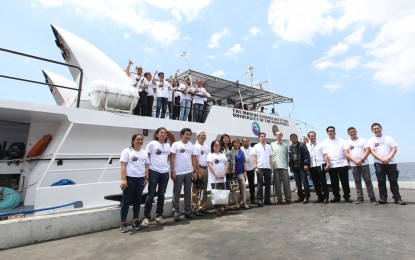
(PNA photo by Avito C. Dalan)
MANILA -- Young Filipino scientists and experts sailed to the West Philippine Sea (WPS) on Monday to assess the marine life at the Kalayaan Island Group (KIG) and its role on Luzon and Palawan's food security.
"Are the islands in the KIG essential for the mainland Luzon and Palawan? The answer is a big yes," said Dr. Fernando Siringan, director at the University of the Philippines-Marine Science Institute (UP-MSI), citing data collected in the past two decades.
At this stage, however, this assertion is based only from few samplings, Siringan said, thus the need to conduct periodic monitoring and research to strengthen this "hypothesis"-- that there is a connection between the disputed features and the food that sustains majority of Filipinos.
The initiative "Predicting Responses between Ocean Transport and Ecological Connectivity of Threatened ecosystems in the West Philippine Sea" or PROTECT WPS is a two-week joint scientific expedition led by the UP-MSI in coordination of the Bureau of Fisheries and Aquatic Resources (BFAR).
The Department of Environment and Natural Resources Biodiversity Management Bureau-funded project is the sixth expedition that the UP-MSI will be joining and the first joint activity by the three agencies.
The ships that will be used for the purposes of marine scientific research are the BRP Lapu-Lapu and the RV Kasarinlan (Eagle V) -- also the first research vessel of the UP-MSI making its maiden voyage to the West Philippine Sea.
Included in their two-week cruise are biological and oceanographic research as well as surveys in some reefs to generate baseline data that would be useful to national agencies and the public.
"In science, we emphasize that all ecosystems are interconnected and interdependent. We need to understand that if you need to secure 'yong fisheries in the mainland, we need to understand what supplies it. And part of it is understanding the role of Kalayaan Island Group," said PROTECT WPS chief scientist Deo Florence Onda.
In an interview, Onda described the all-Filipino expedition as a big leap for the Philippines. "It's a big leap for Filipinos. There's an appreciation of science and (it is) also encouraging the youth to be actively involved in pursuing profession or career in science."
The age range of PROTECT WPS crew are between 21 and 59 years. Although relatively young, Onda said these scientists are "good in what they do".
Romina Therese Lim, one of PROTECT WPS crew focusing on the interaction of marine biomes and benthic ecology in the area expressed excitement, saying the data they could generated would help spread awareness among Filipinos.
"The expedition is very timely, very relevant especially with what's happening now. It's important that we communicate what will come out of the research because there are some who are misinformed, for example, on coral reefs, etc.," she said.
The expedition will take place from April 22 to May 6, 2019 with at least 74 participants from different agencies including the UP-MSI, BFAR, and the DENR-BMB. (PNA)
